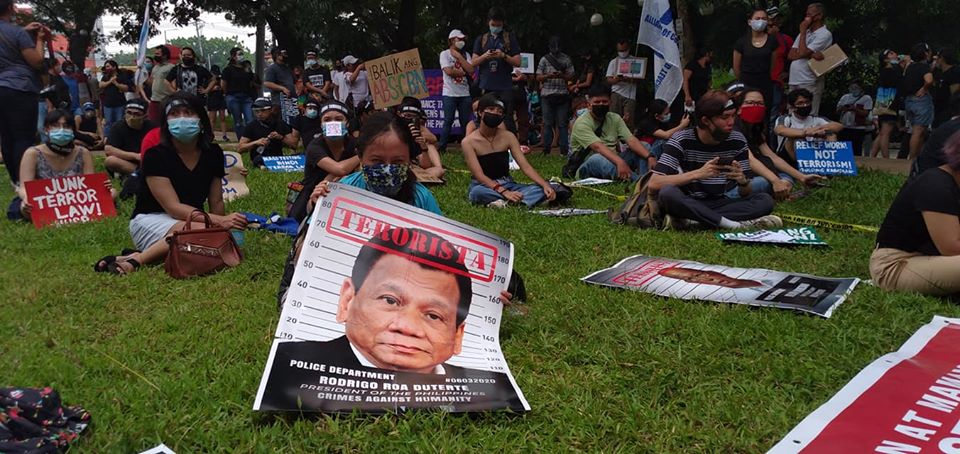“It is clear that the law will be used against critics and dissenters.”
By RONALYN V. OLEA
Bulatlat.com
MANILA – Human rights lawyers are one in saying that the newly-enacted Anti-Terror Law or Republic Act 11479 violates the 1987 Philippine Constitution.
While Section 4 of RA 11479 states “that terrorism shall not include advocacy, protest, dissent, stoppage of work, industrial or mass action, and other similar exercises of civil and political rights, Bayan Muna Chairperson Neri Javier Colmenares said the main problem is that the law penalizes intention.
“…[I]t is so easy for Duterte to say that your rallies endanger other people’s lives because there is a pandemic,” Colmenares said in his speech at Diokno Park inside the Commission on Human Rights compound, July 11.
Antonio La Viña, former dean of the Ateneo School of Government and member of Concerned Lawyers for Civil Liberties, also said that under the new law, protests could be labeled as “terrorist” if authorities would declare that such protests “intimidate the public, seriously undermine public safety or create an atmosphere of fear.”
Colmenares said the law will not be used against terrorists. “It is clear that the law will be used against critics and dissenters,” he said.
He said that Duterte’s track record proves he is intolerant of dissent, citing how Sen. Leila de Lima ended up in jail, how Supreme Court Justice Ma. Lourdes Sereno was removed from her post and how Catholic bishops were charged with inciting to sedition, all because of their being vocal critics.
WATCH Bayan Muna Chair Neri Colmenares calls on the people to intensify protests against the Anti-Terror Law. https://t.co/Qfraug2C1x
— Bulatlat (@bulatlat) July 11, 2020
Colmenares also debunked Sen. Panfilo Lacson’s claim that Duterte has no authority to tag anyone as terrorist.
“That is very naive and very deceptive,” Colmenares said, pointing out that the Anti-Terrorism Council is composed of Duterte’s Cabinet members and “yes” men including the military, police, and intelligence agencies.

While authors of the law claimed that authorities will respect human rights, Colmenares retorted that drug suspects are being killed in the Philippines and suspected terrorists stand to suffer the same fate.
Lawyer Howard Calleja, whose group was first to file a petition questioning the constitutionality of the Anti-Terror Law, also maintained that the law violates human rights.
“We are against terrorism but the law [against terrorism] should not violate human rights and the Philippine Constitution,” Calleja said.
Calleja lamented that the law allows detention without warrant for up to 24 days, surveillance, interrogation, among others “that violate right to due process.”
For his part, Ephraim Cortez, secretary general of the National Union of Peoples’ Lawyers (NUPL), said that the new law does not protect citizens from possible abuse.
Cortez said that NUPL’s clients from Karapatan, Bagong Alyansang Makabayan and Movement Against Tyranny (MAT) have been subjected to vicious red-tagging even before the passage of the law. He said they have a reason to believe that attacks on human rights defenders would escalate, with the new law as another weapon by the state.
Former Sanlakas Rep. JV Bautista also underscored that the under the new law, police and other state agents would not be held liable if suspected terrorists are proven innocent.
Junk the law
Colmenares urged the public to exhaust all measures and avenues to junk the Anti-Terror Law. He called on the people to push legislators to withdraw their support to the law and to repeal the law.
Colmenares welcomed the filing of petitions against the law by several groups. “We should also urge the Supreme Court to side with the people, to stand for human rights,” he said.
The veteran activist called on the people, especially the youth, to continue the protests online and in the streets. “Our biggest victories were gained through protests. We should not stop protesting,” he said.
The post ‘Advocacy, protests could be declared terrorist’ — lawyers appeared first on Bulatlat.

